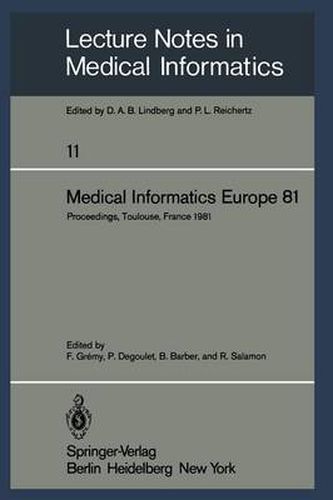Readings Newsletter
Become a Readings Member to make your shopping experience even easier.
Sign in or sign up for free!
You’re not far away from qualifying for FREE standard shipping within Australia
You’ve qualified for FREE standard shipping within Australia
The cart is loading…






This title is printed to order. This book may have been self-published. If so, we cannot guarantee the quality of the content. In the main most books will have gone through the editing process however some may not. We therefore suggest that you be aware of this before ordering this book. If in doubt check either the author or publisher’s details as we are unable to accept any returns unless they are faulty. Please contact us if you have any questions.
The European Federation for Medical Informatics has established itself as a regional body coordinating activity in medical informatics. The Congress in Toulouse, MIE-81, from 9 - 13 March 1981, is the third congress in the ser ies following MIE-78 in Cambr idge, and MIB-79 in Berlin with a gap during 1980 for the world congress MEDINFO-80 in Tokyo. The rationale behind all these congresses is the scientific need to share results and ideas and the educational need to train a wide variety of professional staff in the potential of health care and medical informatics. All the caring professions are involved, doctors, scientists, nurses, para-medical staff, administrators, health care planners, community physicians, epidemiologists, statisticians, operations analysts together with specialists from the computing profession dealing with system analysis, hardware, software, languages, data-bases and the marketing of systems. Medical Informatics is a very wide subject with ramifications throughout the health care and preventive services; it offers a key to the monitoring and improvement of patient care and to the provision of a healthier environment. The collection and evaluation of relevant data improves our understanding of the ways in which health care is provided while the availability of cheaper computer hardware and more versatile software enables us to design and implement more revealing and intelligent medical systems. Even though typical systems take a substantial amount of time to design, implement and evaluate, there is the continuing need for informaticians to assess the current state of developmen.
$9.00 standard shipping within Australia
FREE standard shipping within Australia for orders over $100.00
Express & International shipping calculated at checkout
This title is printed to order. This book may have been self-published. If so, we cannot guarantee the quality of the content. In the main most books will have gone through the editing process however some may not. We therefore suggest that you be aware of this before ordering this book. If in doubt check either the author or publisher’s details as we are unable to accept any returns unless they are faulty. Please contact us if you have any questions.
The European Federation for Medical Informatics has established itself as a regional body coordinating activity in medical informatics. The Congress in Toulouse, MIE-81, from 9 - 13 March 1981, is the third congress in the ser ies following MIE-78 in Cambr idge, and MIB-79 in Berlin with a gap during 1980 for the world congress MEDINFO-80 in Tokyo. The rationale behind all these congresses is the scientific need to share results and ideas and the educational need to train a wide variety of professional staff in the potential of health care and medical informatics. All the caring professions are involved, doctors, scientists, nurses, para-medical staff, administrators, health care planners, community physicians, epidemiologists, statisticians, operations analysts together with specialists from the computing profession dealing with system analysis, hardware, software, languages, data-bases and the marketing of systems. Medical Informatics is a very wide subject with ramifications throughout the health care and preventive services; it offers a key to the monitoring and improvement of patient care and to the provision of a healthier environment. The collection and evaluation of relevant data improves our understanding of the ways in which health care is provided while the availability of cheaper computer hardware and more versatile software enables us to design and implement more revealing and intelligent medical systems. Even though typical systems take a substantial amount of time to design, implement and evaluate, there is the continuing need for informaticians to assess the current state of developmen.